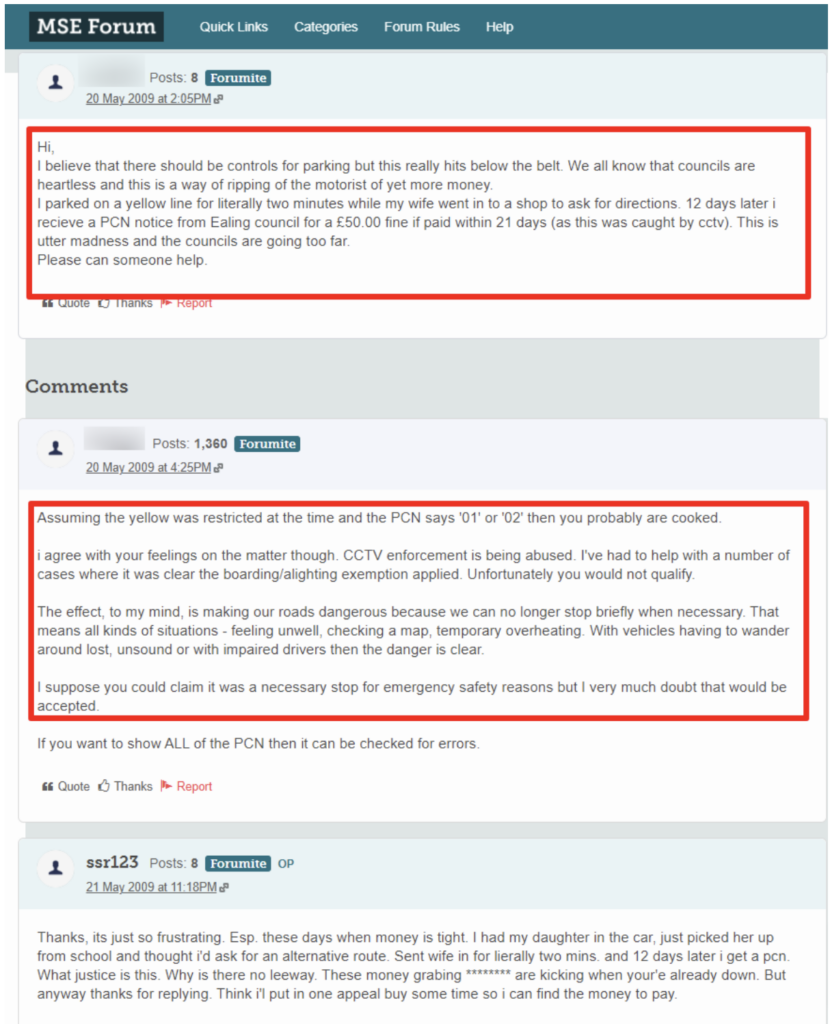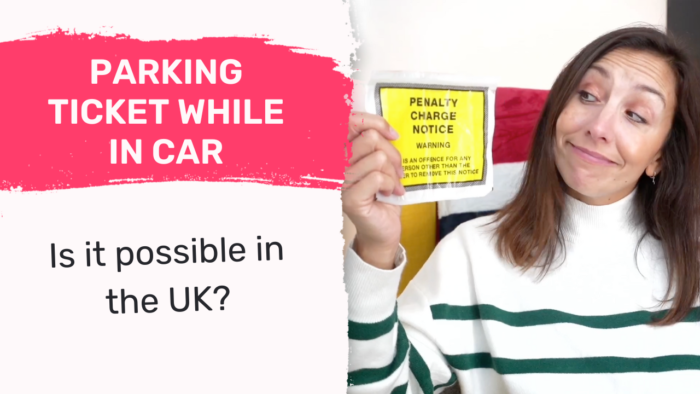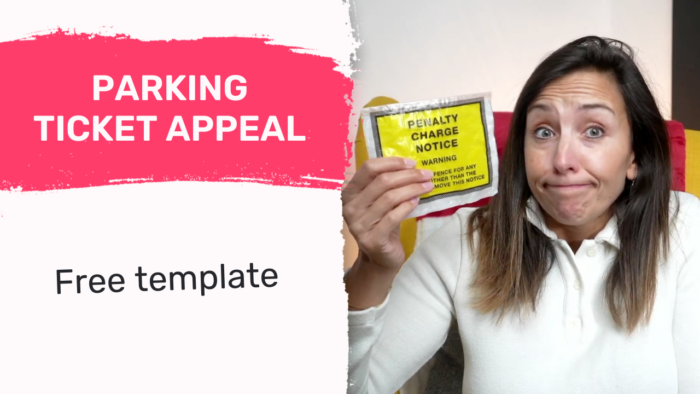Should I Pay or Appeal my Ealing Council Parking Fine?
Have you got a parking fine from Ealing Council? This can feel scary and confusing. But don’t worry. Each month, over 32,000 people turn to this site for guidance on tickets and fines, so we know how you feel, and we’re here to help you.
In this guide, we’ll explain:
- What an Ealing Council Parking Fine is and why you got one.
- The ways to appeal and maybe even beat your fine.
- The different types of things you can get fined for.
- What happens if you don’t pay your fine.
- Where to find more help if you need it.
Our team knows how to deal with these fines, and we understand how you’re feeling right now. Let’s sort out your parking fine together.
Do You Have to Pay?
In some circumstances, you might have a legitimate reason not to pay your fine.
It’s a bit sneaky, but the last time I needed legal advice, I paid £5 for a trial to chat with an online solicitor called JustAnswer.
Not only did I save £50 on solicitor feeds, I also won my case and didn’t have to pay my £271 fine.
Chat below to get started with JustAnswer
In partnership with Just Answer.
Offences Covered by an Ealing Council Parking Fine
Local councils in the UK, including Ealing Council, generally issue penalty charge notices for reasons related to violations of parking regulations. I’ve listed some of the common offences, below.
- Overstaying time limits – Parking for longer than permitted in a time-restricted area.
- No valid ticket or permit – Not displaying a valid pay and display ticket or parking permit.
- Parking in a restricted area – For instance, parking on a yellow line during restricted hours.
- Using reserved spaces – Parking in spaces reserved for disabled drivers without a valid blue badge, or parking in resident permit spaces without the correct permit.
- Parking in loading/unloading areas – Parking in loading bays without loading or unloading.
- Parking in school zones – During drop-off or pick-up hours where restrictions apply.
- Parking on pedestrian crossings – Or within the marked area adjacent to it.
- Parking on footpaths – Or on any part of the road other than a carriageway.
- Not parking correctly within the markings – For example, taking up two spaces in a car park.
- Parking in a bus stop – Or other areas designated for public transport.
- Parking at dropped kerbs – This can obstruct access for wheelchairs, pushchairs, or vehicles that need to cross the pavement.
- Parking in cycle lanes – Particularly if there are clear markings indicating no stopping or parking.
How are PCNs issued?
You won’t always return to your vehicle and find a penalty charge notice placed on your car. There are several ways that a PCN might be issued, and I have covered them all, below.
- On the spot – If a Civil Enforcement Officer (CEO) or a parking attendant witnesses a parking violation, they can issue a PCN on the spot. Typically, this involves placing the PCN on the vehicle’s windscreen or handing it directly to the driver if they are present. This method is common for parking offences.
- By post – Some PCNs are sent by post. This is often the case for offences caught on camera. For example, if a vehicle is caught in a bus lane or commits a moving traffic offence that’s monitored by camera, the registered keeper of the vehicle can receive the PCN by post. The notice is typically sent after the local authority accesses the driver’s details from the DVLA (Driver and Vehicle Licensing Agency).
- Electronic PCNs – Some local authorities or private companies offer the option for drivers to receive electronic PCNs, often via email or a mobile app. However, this is more common for private parking notices and not standard council-issued PCNs.
When a PCN is issued, whether in person or by post, it should include the information listed, below.
- Details of the alleged offence (e.g., parking in a restricted area).
- Information on how to pay the fine.
- The amount of the fine and if any discount applies for early payment.
- How to appeal the PCN if the recipient believes it was wrongly issued.
- Photographs or evidence of the offence (especially if sent by post).
Successful Appeal Case Study
Situation
| Initial Fine | £100 |
| Additional Fees | £171 |
| Total Fine | £271 |
The Appeal Process
Scott used JustAnswer, online legal service to enhance his appeal. The trial of this cost him just £5.
| Total Fine | £271 |
| Cost of legal advice | £5 |
JustAnswer helped Scott craft the best appeal possible and he was able to win his case.
Scott’s fine was cancelled and he only paid £5 for the legal help.
In partnership with Just Answer.
How to Make an Appeal Against an Ealing Council Parking Fine
If you believe that an Ealing Council PCN was unfairly issued, you have the right to challenge it.
» TAKE ACTION NOW: Get legal support from JustAnswer
The following steps outline the process to make an appeal against a parking fine from Ealing Council.
-
Informal challenge – This is the first stage of the appeal process. Consider using an appeal letter template for this.
- You can make an informal challenge within 14 days of receiving the PCN.
- Typically, the PCN itself will have instructions on how to submit this challenge, often via an online portal, post, or email.
- Provide as much evidence and detail as possible to support your challenge. This might include photographs, witness statements, or any other relevant documents.
-
Notice to Owner (NTO) – If your informal challenge is rejected (or if you missed the 14-day window for the informal challenge), the council will send a Notice to Owner to the registered keeper of the vehicle.
- Once you receive the NTO, you have 28 days to make a formal representation.
- This can again be done online, by post, or sometimes by email.
- Clearly state the grounds of your appeal and provide evidence to support your claim.
-
Notice of Rejection – If the council rejects your formal representation, they will send you a Notice of Rejection letter.
- Along with the Notice of Rejection, they will usually send you a form or provide instructions to appeal to an independent adjudicator.
-
Appeal to an Independent Adjudicator – If you’re still not satisfied with the council’s decision, you can take your case to the independent Traffic Penalty Tribunal (TPT) in England and Wales.
- The TPT is an impartial organisation that reviews parking and traffic penalties.
- You’ll need to lodge your appeal within 28 days of receiving the Notice of Rejection.
- The adjudicator’s decision is final and binding on both parties.
Join thousands of others who got legal help for a £5 trial
Getting the support of a Solicitor can take a huge weight off your mind.
Reviews shown are for JustAnswer.
Can You Ignore a PCN From Ealing Council?
Ignoring a PCN from Ealing Council (or any UK local authority) is not advisable, as they never expire. I have listed the timeline for increasing penalties below.
- Increased charges – If you don’t pay the PCN within the specified time (usually 14 days), the discount period will end, and you will have to pay the full amount, which is typically double the discounted rate.
- Notice to Owner (NTO) – If the PCN remains unpaid after the initial period, the council will send a Notice to Owner to the registered keeper of the vehicle. This notice will demand payment of the full penalty and will provide another chance to make representations against the charge.
- Charge certificate – If the penalty is not paid within 28 days of the NTO being served, the council can increase the charge by 50%. At this stage, you can no longer make formal representations or appeal to an independent adjudicator.
- Order for Recovery – If the increased charge is not paid within 14 days of the Charge Certificate being issued, the council can obtain an Order for Recovery. This will include an additional registration fee.
- Enforcement agents – If the debt remains unpaid, the council can use enforcement agents (formerly known as bailiffs) to recover the debt. This could result in additional fees, and the enforcement agents might seize goods or assets to the value of the debt.
- Potential Impact on credit rating – Non-payment and subsequent action might impact your credit rating, making it more challenging to obtain credit in the future.

Hire a Parking Solicitor for less than a coffee.

If you’re thinking about appealing your parking ticket then getting some professional advice is a good idea.
Getting the support of a Solicitor can make your appeal much more likely to win.
For a £5 trial, Solicitors from JustAnswer can look at your case and help you create an airtight appeal.
In partnership with Just Answer.


